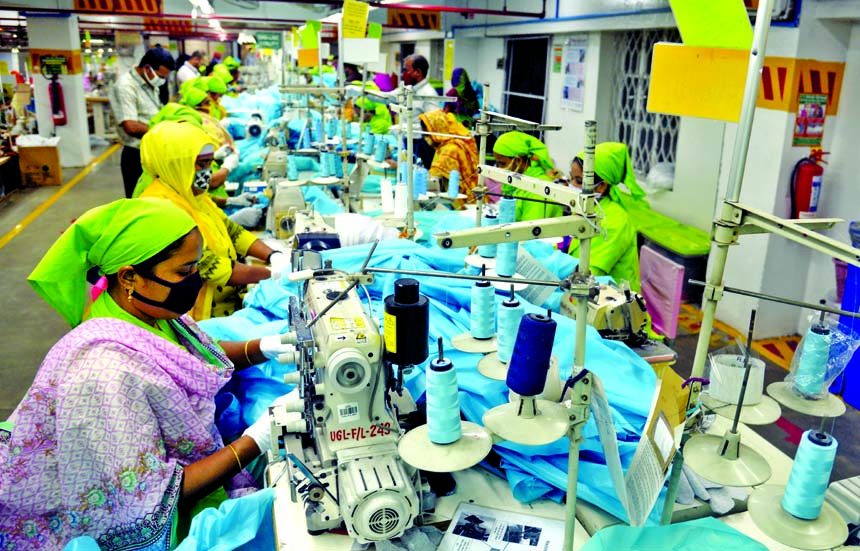
Special Correspondent :
Like in most other nations, the outbreak of Covid-19 pandemic sends an unprecedented shock to the Bangladesh economy.
The pandemic driven slowdown in economic activities still persists although businesses reopen after months of shutdowns put in place to halt the spread of the coronavirus.
Economists also knock down the hopes of quick rebound as long as the pandemic uncertainty persists.
“Until Covid-19 uncertainty melts away, there is little chance of full economic recovery,” said Dr Zahid Hussain, a former lead economist at the World Bank’s Dhaka office.
He said the recovery is expected to be ‘slow and gradual’ though the economy is on its way back.
“A full recovery may take years… The evidence so far suggests it will be a long haul,” Dr Zahid Hussain told The New Nation, adding, “The recovery will hinge largely on the government’s policy responses and the country’s ability to contain the virus that has infected about 1.5 million Bangladeshis and continues to spread.”
He said the government has already announced a big stimulus package to aid the businesses hit by nationwide shutdown. “But a slow disbursement of stimulus funds further worsens owes of the businesses. The government should take bold steps in this regard and focus more on supporting SMEs to protect jobs and keep up livelihood of millions of people employed in this vital economic sector.”
Dr Zahid Hussain observed that entrepreneurs were paralysed by uncertainty over their future prospects and therefore reluctant to invest. “The government can step in and fill the gap left by the private sector, because state investment in public works would boost economic activity and help revive the economy. But the fact is that the government exchequer remains under pressure due to huge shortfall in revenue collection.”
Dr AB Mirza Azizul Islam, former adviser to the caretaker government, said the global health crisis caused by Covid-19 has wrecked havoc on the Bangladesh economy. “Economic woes deepened further because of countrywide shutdown enforced to tackle the pandemic. The rural economy in particular hit hard due to coronavirus induced economic slowdown.
Now pressure has been added to it as thousands of jobless people trudge back village homes from the capital and various cities. The returnees can hardy manage a job in village because crisis was already there. So, they are now facing risk falling deeper into poverty,” he said.
Around 3.6 crore people lost their jobs in the 66-day countrywide lockdown declared by the government to contain the coronavirus pandemic, according to Bangladesh Economic Association (BEA).
Dr Islam, who now teaches economics at BRAC University, also said that the pandemic will also exaggerate inequality and fuel tension in the society unless the government ramp up action to protect people, especially the poorest and most vulnerable. “Corruption in the distribution of relief and other social safety net programmes should be stopped to ensure their well-being and maintain peace in the society.”
When asked, he said, “The country faces enormous challenge to reshape its economy as profound uncertainty loom about the virus and its trajectory. The situation will continue throughout the year digging to get the economy back on its pre-pandemic level.”
Dr Ahsan H Mansur, executive director of the Policy Research Institute of Bangladesh, a think-tank in Dhaka, noted the national economy has suffered serious setback due to shutdown and other measures imposed to combat the coronavirus.
“As the Covid-19 outbreak has recently intensified hopes for an accelerated, sustained and successful reopening of the economy have hit roadblocks,” he added.
Dr H Ahsan Mansur, a former Economist of International Monetary Fund (IMF), said the government allowed reopening without scientific evidences and proper health safety measures on the hope that the economy will bounce back. “But the hope is not realized and the evidence so far suggests it will be a long haul.”
He also mentioned that the cconomy’s almost all major indicators have dipped due to the Covid-19 induced disruptions. Now the economy is facing one of the largest downturns since the independence as forecast by the World Bank.
The coronavirus pandemic is set to bring down the country’s GDP growth from an all-time high 8.15 per cent recorded in the last fiscal year to straight 1.6 per cent in the last fiscal year, according to a World Bank forecast.
If the GDP growth comes down to 1.6 percent as per World Bank’s projections, it will be the lowest figure in 37 years in Bangladesh
“Trying to force our way back to economic growth now would be the wrong choice from the government when thousands of people became jobless and enterprises shuttered their operations amid Covid-19 shocks. The increasing liquidity buffers to firms in affected sectors is also necessary to keep them operational and restore jobs,” he said.

